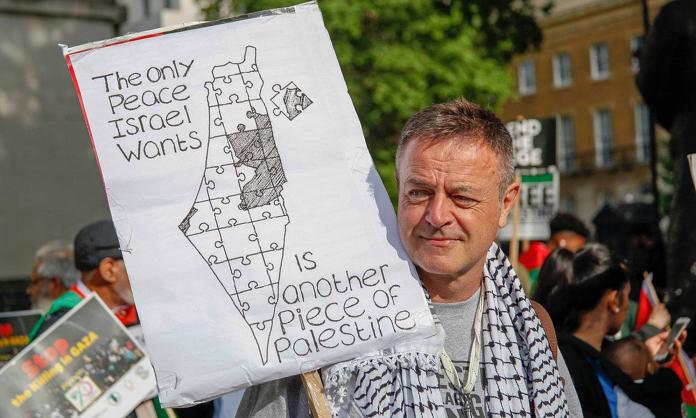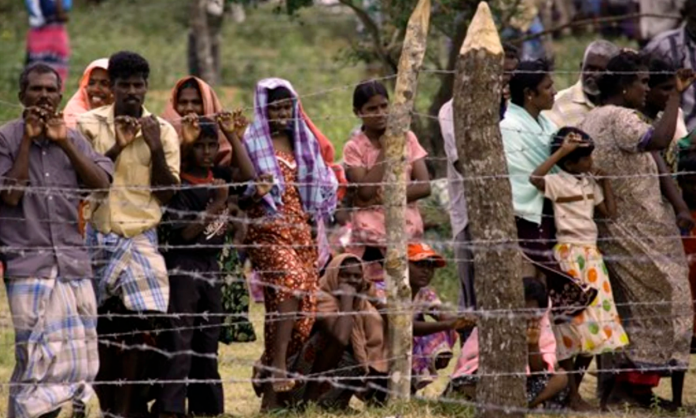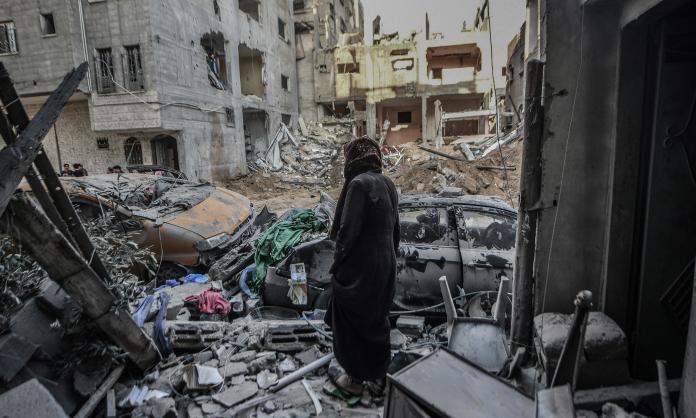The ex-archbishop of Cape Town and prominent leader of the anti-apartheid movement in South Africa, Desmond Tutu, wrote in 2002: “I’ve been very deeply distressed in my visit to the Holy Land; it reminded me so much of what happened to us black people in South Africa. I have seen the humiliation of the Palestinians at checkpoints and roadblocks, suffering like us when young white police officers prevented us from moving about”.
It has been commonplace for decades in Palestine activist circles to point out the similarities between South African apartheid and Israel. In recent years, several prominent human rights and legal organisations have also declared Israel an apartheid state.
For example, B’Tselem, the Israeli Centre for Human Rights in the Occupied Territories, concluded in 2021, “The bar for defining the Israeli regime as an apartheid regime has been met after considering the accumulation of policies and laws that Israel devised to entrench its control over Palestinians”.
The International Human Rights Clinic at Harvard Law School and the Addameer Prisoner Support and Human Rights Association released a joint statement last year, which argued: “Israel’s deliberate, institutionalized, and explicitly legal subjugation of Palestinians leads to the conclusion that Israel is in breach of the prohibition of apartheid under international law”.
Also last year, Amnesty International released a 280 page document arguing that Israeli practices of domination and control over Palestinians fall under the international legal definition of apartheid. Amnesty established the following key components of Israeli apartheid:
“[T]erritorial fragmentation; segregation and control through the denial of equal nationality and status, restrictions on movement, discriminatory family reunification laws, the use of military rule and restrictions on the right to political participation and popular resistance; dispossession of land and property; and the suppression of Palestinians’ human development and denial of their economic and social rights.”
The Amnesty document is thorough and unflinching in its description of the many mechanisms of oppression and control that Israel enacts over the Palestinians. To have such injustice so carefully documented is welcome.
For the Palestinian movement, the use of the word apartheid is also understandable. The global movement against apartheid was powerful and left a legacy. To argue that Israel is an apartheid state helps popularise hostility to it, mobilise support for Palestinians and cut through Israeli propaganda. Nevertheless, the description of Israel as a state whose “discriminatory laws, policies and practices” amount to apartheid doesn’t entirely capture the situation, which is in fact worse.
While Israeli Prime Minister Benjamin Netanyahu’s precise endgame in Gaza isn’t clear, there are members of the Israeli parliament, particularly those from the far right, who are explicit in their goal: to ethnically cleanse both Gaza and the West Bank of all Palestinians. Indeed, Israeli Finance Minister Bezalel Smotrich says that ethnic cleansing of Gaza is the “right solution”. While figures like Smotrich are on the extreme edge of the Israeli political scene, there is ample evidence that he is merely putting words to the reality of Israeli practices since 1948, which have been about not simply “discrimination”, but genocide.
Other articles in Red Flag have argued that Israel’s treatment of the Palestinians can be categorised as genocide, according to the criteria outlined in the UN genocide convention. The question is why genocide, rather than apartheid, is the ultimate goal of the Israeli state.
One answer has been provided by Israeli socialist Moshe Machover, who argued in a 2004 article that Israel is an ethnically exclusivist colonial settler state whose project of colonisation has not been concluded. “The first exceptional feature of Zionist colonization is that it was historically the last colonization project to get off the ground”, he wrote. “And it is the last and currently the only one to remain active—active as in ‘active volcano’, as opposed to an extinct one.”
Machover maintains that there are crucial differences between the South African and Israeli colonial settler projects—differences that have profound implications for understanding the manner in which Israel operates. In particular there are “two distinct species of the (colonial settler) genus”. Both are related to the capitalist dynamics of the countries.
South African apartheid represented a strengthening and intensifying of many of the most discriminatory features of the pre-existing South African economic, social and political system. The central purpose of apartheid was to control the emerging black working class so as to allow the development of a super-profitable South African capitalism. Racial oppression was tied into the development of the profit system: South African capitalism was based on the super-exploitation of the black workforce; minority white profits rested on the labour of the black majority.
“Capitalist production in South Africa owes its success to the availability of a regimented cheap labour force”, South African historian Baruch Hirson wrote in his seminal work Year of Fire, Year of Ash: The Soweto Revolt. “In the vast rural slums, known as Reserves, the women and children, the aged, the sick and the disabled eke out a bare existence. All rely on the remittances of their menfolk in the towns. The accommodation in townships, in hostels, or in compounds (barracks) is likewise organized in order to depress African wage levels. At the same time, the vast urban slums ... were planned in order to ensure complete police and military control, were the administrative system ever to be challenged.”
Israel was also founded as a colonial settler state in one of the most important strategic and economic regions in the world. The most significant difference, however, between South Africa and Israel was that Israel was built to be an ethnically exclusivist state. This resulted in the building of an economy that attempted to be entirely Jewish: Jewish bosses and Jewish workers. In 1982, Jewish Palestinian Marxist Tony Cliff remembered his youthful years in Palestine. He describes the process of the establishment of Zionist separateness:
“The Zionists organised their own trade union, the Histadrut, which raised two political funds. One was called ‘the defence of Hebrew Labour’, the other ‘the defence of Hebrew products’. These funds were used to organise pickets to prevent Arabs working in Jewish enterprises and to stop Arab produce coming into Jewish markets. They did nothing to damage Zionist businesses.
“In 1944 we lived near Tel Aviv market. One morning my wife saw a young man go around talking to all the women selling produce. Some he left alone, but others had paraffin poured on the vegetables and their eggs smashed. My wife, who had just come from South Africa, couldn’t believe it. ‘What’s going on?’ she asked. It was simple. The man checked if the produce was Hebrew or Arab, and destroyed Arab produce.”
The desire to establish an ethnically exclusivist state required a monopoly over the land. But whose land? Despite the Zionist mythology that Palestine was a “land without a people” there were in fact millions of Christian, Muslim and Jewish Arabs already living there. The establishment of Israel as exclusivist state therefore required the expulsion of the non-Jewish inhabitants. The Israeli economy does not rely on Palestinian labour, which makes Palestinians expendable at best.
“Zionist/Israeli strategy has always had a twofold aim: maximize Jewish colonization of land, minimize its Arab population”, Machover argued in another piece. In the lead-up to 1948, this required a war. It required the Nakba (“catastrophe” in Arabic). But the establishment of the state of Israel did not settle the question. Israel is ceaselessly expansionist. This is evidenced by the wars in 1967, the settlement projects and the various skirmishes on the border of Lebanon. Israel is expansionist both because it can be—it is powerful enough to keep up attempts to claim more land and territory—but also because of its failure to finally defeat the Palestinians.
The Nakba and the subsequent decades of oppression of the indigenous Arab population resulted in the development of a Palestinian national identity. The identity became bound up with territorial demands—that stolen lands be returned. Despite Palestinians living in non-contiguous territories in Gaza, the West Bank, East Jerusalem and across the Middle East, they have retained a remarkable commitment to their national identity. The Israeli state would prefer them either to die or to disperse and become part of the rest of the Arab world. To the contrary, Palestinians have fought back with determination. They have refused to go quietly into the night.







